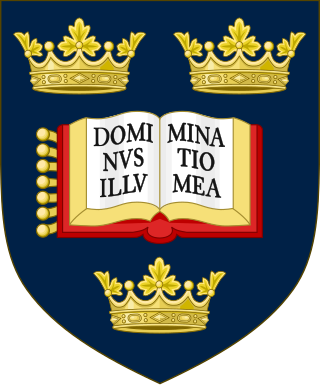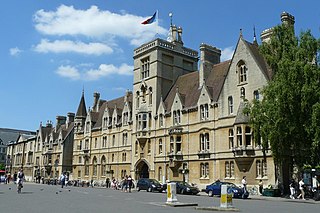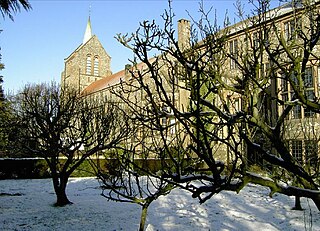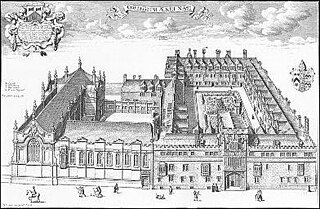Related Research Articles

The University of Oxford is a collegiate research university in Oxford, England. There is evidence of teaching as early as 1096, making it the oldest university in the English-speaking world and the world's second-oldest university in continuous operation. It grew rapidly from 1167, when Henry II banned English students from attending the University of Paris. After disputes between students and Oxford townsfolk in 1209, some academics fled north-east to Cambridge where they established what became the University of Cambridge. The two English ancient universities share many common features and are jointly referred to as Oxbridge.

Clare College is a constituent college of the University of Cambridge in Cambridge, England. The college was founded in 1326 as University Hall, making it the second-oldest surviving college of the University after Peterhouse. It was refounded in 1338 as Clare Hall by an endowment from Elizabeth de Clare, and took on its current name in 1856. Clare is famous for its chapel choir and for its gardens on "The Backs".

Balliol College is a constituent college of the University of Oxford. Founded in 1263 by John I de Balliol, it has a claim to be the oldest college in Oxford and the English-speaking world.

Campion Hall is one of the four permanent private halls of the University of Oxford in England. A Catholic hall, it is run by the Society of Jesus and named after Edmund Campion, a martyr and fellow of St John's College, Oxford. The hall is located on Brewer Street, between Christ Church and Pembroke College. The buildings, along with many of the fixtures and fittings, were designed by Sir Edwin Lutyens, his only buildings in Oxford. The hall also houses an extensive collection of religious art spanning 600 years; the pieces were collected primarily by Fr Martin D'Arcy in the 1930s.

Exeter College is one of the constituent colleges of the University of Oxford in England and the fourth-oldest college of the university.

Greyfriars is a Roman Catholic friary and parish located in East Oxford, which until 2008 was also a permanent private hall of the University of Oxford. Situated on the Iffley Road in East Oxford, it was one of the smallest constituent halls of the university. Its status as a permanent private hall (PPH) derived from the fact that it was governed by an outside institution, rather than by the fellows of the University as a constituent college is.

Lady Margaret Hall (LMH) is one of the constituent colleges of the University of Oxford in England, located on a bank of the River Cherwell at Norham Gardens in north Oxford and adjacent to the University Parks. The college is more formally known under its current royal charter as "The Principal and Fellows of the College of the Lady Margaret in the University of Oxford".

St Anne's College is a constituent college of the University of Oxford in England. It was founded in 1879 and gained full college status in 1959. Originally a women's college, it has admitted men since 1979. It has some 450 undergraduate and 200 graduate students and retains an original aim of allowing women of any financial background to study at Oxford. It still has a student base with a higher than average proportion of female students. The college stands between Woodstock and Banbury roads, next to the University Parks. In April 2017, Helen King, a retired Metropolitan Police Assistant Commissioner, took over as Principal from Tim Gardam. Former members include Danny Alexander, Edwina Currie, Ruth Deech, Helen Fielding, William MacAskill, Amanda Pritchard, Simon Rattle, Tina Brown, Mr Hudson and Victor Ubogu.

St Benet's Hall was a permanent private hall (PPH) of the University of Oxford, originally a Roman Catholic religious house of studies. It closed in 2022. The principal building was located at the northern end of St Giles' on its western side, close to the junction with Woodstock Road, Oxford.

St Hilda's College is one of the constituent colleges of the University of Oxford in England. The college is named after the Anglo-Saxon saint Hilda of Whitby and was founded in 1893 as a hall for women; it remained a women's college until 2008. St Hilda's was the last single-sex college in the university as Somerville College had admitted men in 1994. The college now has almost equal numbers of men and women at both undergraduate and postgraduate level.

St Peter's College is one of the constituent colleges of the University of Oxford. Located on New Inn Hall Street, Oxford, United Kingdom, it occupies the site of two of the university's medieval halls dating back to at least the 14th century. The modern college was founded by Francis James Chavasse, former Bishop of Liverpool, opened as St Peter's Hall in 1929, and achieved full collegiate status as St Peter's College in 1961. Founded as a men's college, it has been coeducational since 1979.

Emmanuel College is a constituent college of the University of Cambridge. The college was founded in 1584 by Sir Walter Mildmay, Chancellor of the Exchequer to Elizabeth I. The site on which the college sits was once a priory for Dominican monks, and the College Hall is built on the foundations of the monastery's nave. Emmanuel is one of the 16 "old colleges", which were founded before the 17th century.

Corpus Christi College is a constituent college of the University of Cambridge. From the late 14th century to the early 19th century it was also commonly known as St Benet's College.

The University of Oxford has thirty-nine colleges, and four permanent private halls (PPHs) of religious foundation. Colleges and PPHs are autonomous self-governing corporations within the university. These colleges are not only houses of residence, but have substantial responsibility for teaching undergraduate students. Generally tutorials and classes are the responsibility of colleges, while lectures, examinations, laboratories, and the central library are run by the university. Students normally have most of their tutorials in their own college, but often have a couple of modules taught at other colleges or even at faculties and departments. Most colleges take both graduates and undergraduates, but several are for graduates only.

Heythrop College, University of London, was a constituent college of the University of London between 1971 and 2018, last located in Kensington Square, London. It comprised the university's specialist faculties of philosophy and theology with social sciences, offering undergraduate and postgraduate degree courses and five specialist institutes and centres to promote research.

The Colleges of Durham University are residential colleges that are the primary source of accommodation and support services for undergraduates and postgraduates at Durham University, as well as providing a focus for social, cultural and sporting life for their members, and offering bursaries and scholarships to students. They also provide funding and/or accommodation for some of the research posts in the University. All students at the University are required to be members of one of the colleges.

Harris Manchester College (HMC) is one of the constituent colleges of the University of Oxford in the United Kingdom. It was founded in Warrington in 1757 as a college for Unitarian students and moved to Oxford in 1893. It became a full college of the university in 1996, taking its current name to commemorate its predecessor the Manchester Academy and a benefaction by Lord Harris of Peckham.

The following is a timeline of the history of the city, university and colleges of Oxford, England.

St Benet's Hall Boat Club is a rowing club in Oxford. It used to be the boat club of now defunct St Benet's Hall, Oxford. It is based on the Isis at Boathouse Island, Christ Church Meadow, Oxford.
The private halls of the University of Oxford were educational institutions within the University. They were introduced by the statute De aulis privatis in 1855 to provide a less expensive alternative to the colleges and academic halls of the early nineteenth century. They survived until 1918, when the last two private halls were recognised as permanent private halls.
References
- ↑ "Permanent Private Halls". University of Oxford. Archived from the original on 24 September 2015. Retrieved 20 September 2015.
- ↑ Statuta Universitatis Oxoniensis [Oxford University Statutes] (in Latin). University of Oxford. 1876. pp. 275–279. Retrieved 6 September 2018.
- ↑ Christopher Hibbert (ed.), "Private halls" in The Encyclopaedia of Oxford (London: Macmillan, 1988), p. 337
- ↑ Storey, Graham (2014). A Preface to Hopkins. Routledge. p. 194. ISBN 9781317896036 . Retrieved 6 January 2020.
- ↑ Aldrich, Richard; Gordon, Peter (2016). "Butler, George (1819–1890)". Dictionary of British Educationists. Routledge. ISBN 9781317949312 . Retrieved 6 January 2020.
- 1 2 "Victoria County History". british-history.ac.uk. pp. 339–340. Retrieved 7 September 2018.
- ↑ "Victoria County History". british-history.ac.uk. pp. 340–341. Retrieved 7 September 2018.
- ↑ Macleod, Donald (24 October 2007). "Oxford religious hall closes down". the Guardian. Retrieved 20 September 2015.
- ↑ "St Stephen's House". University of Oxford. Archived from the original on 7 June 2023. Retrieved 26 December 2022.
